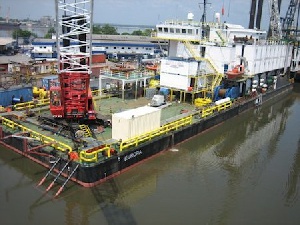The Public Interest and Accountability Committee (PIAC) has reiterated that the continuous operation of the Saltpond Oil Field against the backdrop of dwindling production was not economically viable and therefore Government should consider closing it down.
According to the Committee, the woes of the Oil field was likely to be enfeebled in the subsequent years with crude oil price expected to hover around US52 in 2015 considering the fact that its produced a barrel of crude oil at a cost of US$ 31 in 2014.
This was contained in the recommendations of the PIAC annual report which was presented by the Chairman of the Committee, Professor Paul Buah-Bassuah at the 7th Regional public forum in Cape Coast on Tuesday.
The forum which was attended by Civil Society Organizations (CSOs), religious bodies, traditional leaders and other stakeholders was aimed at encouraging citizens to take profound interest in the use and management of petroleum revenues.
The report also admonished the Saltpond Oil field, the Ministry of Finance (MOF) and the Ghana National Petroleum Corporation (GNPC) to resolve the discrepancies in the production and lifting figures from the field, so as to help determine the actual royalties that ought to have been paid and establish the true performance or the state of affair at that Field.
Prof. Buah- Bassuah indicated that there were inconsistencies in the crude oil figures from the Saltpond Field and explained that while figures provided by the management of the Saltpond Offshore Production Company Limited (SOPCL) showed an increase in a year-to- year production of crude oil, figures published by the Ministry of Finance and the GNPC indicated a decline in production in 2014.
He said according to SOPCL, a gross total of 89,301 barrels of oil was lifted from the Saltpond Field in 2014 compared to 73,548 in 2013, whereas sources at MOF and GNPC similarly indicated otherwise.
He stressed that in order to forestall and deepen accountability and responsiveness in the management of petroleum revenues, Parliament must make it mandatory for the reconciliation report by the Finance Minister to include the list of the projects that were supported by the Annual Budget Funding Amount (ABFA).
The Central Regional Minister, Aquinas Tawiah Quansah in a speech read on his behalf, asked the participants to take keen interest in the main content of the Committee’s report so that they could be empowered to speak from an informed position on the management of petroleum revenues.
Participants and other stakeholders present at the forum expressed displeasure about the disbursement of the 2014 ABFA and argued that more needed to be done to scrutinize the Government on how oil revenues were spent.
They called for the regionalization of PIAC so that the core mandate of the Committee to furnish citizens with oversight responsibility regarding the management of petroleum revenues could be achieved.
PIAC is a statutory committee established under section 56 of the Petroleum Revenue Act (Act 815) in 2011 to monitor and evaluate compliance of the Act by the Government and other relevant institutions in the management and use of petroleum revenues.
Business News of Thursday, 15 October 2015
Source: GNA













